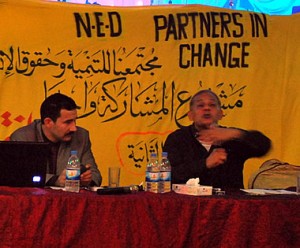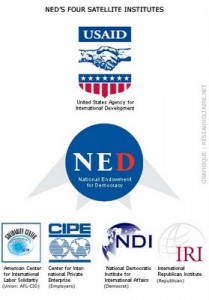Podcast: Play in new window | Download
Updates:
- Camp Delta Cases Won’t Proceed
- NLG 75 Year Anniversary February 20th, 2012
- Supreme Court Chooses To Take Review Affirmative Action Case In Austin, Texas
- Coalition for Immokalee Workers Update
- Groups Condemn Appointment of Archbishop Dolan to Cardinal of New York
———-
Egypt Places Travel Ban On US Citizens: NDI / IRI and Freedom House
Egypt Places Travel Ban and Charges Against US Citizens Working With NDI / IRI and Freedom House In the last few weeks, the military backed Egyptian government has targeted the National Democratic Institute, the International Republican Institute and Freedom House–U.S. government funded groups working in Egypt. These groups have often come under attack as tools of US foreign policy. For example the IRI was blamed for playing a role in the coup against President Aristide of Haiti. As part of its crackdown, the Egyptian authorities raided the offices of some of these organizations and brought charges against at least 16 US citizens, six of whom remain in Egypt.
Three of them including the son of the US Transportation Secretary, Sam LaHood have taken refuge at the US embassy. They’re cases have been referred to criminal courts in Egypt. Recently, Egypt refused to back down despite a US threat to cut aid. We bring you two perspectives on the NDI/IRI and the charges against them. Paul Sullivan from the National Defense University raises serious questions as to whether these US funded organizations should be in Egypt at all. Then, Sally Sami, a human rights activist, is unwilling to be as critical presumably because she sees the crackdown as past of a larger crackdown on democracy advocates in Egypt even if NDI and IRI are not playing a constructive role.
- Essentially these NGOs are not registered in this country. There was an NGO law in 2002 that required these NGOs to register.
- These NGOs state they did put in the documents to register and they didn’t hear anything back and assumed everything was going well.
- They’re also unlicensed. That is also true.
- They’re funded by the US government. The required duties is to train people in exactly what voting is, what is democratic development.
- One of the charges that has been leveled against them is paying political certain parties and of course both these groups deny it. Freedom House, the third one involved also denies it.
- There are certain charges that neither the IRI or the NDI deny.
- The emotions are very high, and the issues are becoming more hardened on both sides.
- When Mubarak was in charge, these organizations were in a wink and a nod were allowed to be in the country.
- Now some of the NGOs that had nothing to do with anything political are now having a difficult time even on the streets of Egypt.
- There has always been a certain degree of anti-Americanism in Egypt. This is starting to stoke anti-Egyptian sentiment on the Hill and in the public. . .many of whom don’t understand Egypt as people who’ve live there, such as I understand Egypt, really quite wonderful people.
- It’s much more important to build friendships, to build relations, to help them get jobs. Investment, education, and human development, and leave the politics to the country.
Guest – Professor Paul Sullivan, professor of economics at the National Defense University (NDU) since July 1999. He is an Adjunct Professor of Security Studies and Science, Technology and International Affairs at Georgetown University, where he teaches classes on global energy and security, energy security in the Middle East, and natural resources and conflict in Africa and the Middle East. Dr. Sullivan was the Vice President, Programs, for the United Nations Association, National Capitol Area, where he was a strategic leader and adviser for the many programs and committees run by UNA-NCA during June 2010 to June 2011.
——
We get another perspective on the ground in Cairo, Egypt. Sally Sami, former director with the Cairo Center for Human Rights Studies and human rights activist.
Sally Sami:
- We’re talking about a moment, a time when the essence of the revolution itself is being stolen.
- We see a revolution that is being arrested, attacked, harassed.
- It seems like we’re being punished for taking the stand, for continuing it to be outspoken about the violations that are taking place, even after the revolution.
- One of the worst attacks was during a Christian protest, and people were killed enmass, we’ve seen this becoming more and more frequent.
- The continued denial of taking the responsibility to the protect the lives of Egyptians.
- We want it clear that should not be any double standards, its a human rights thing, ok? There shouldn’t be any double standards.
- Some countries deserve human rights, some don’t, it depends on the concept of national security, until now we don’t know what it means.
Guest – Sally Sami, former director with the Cairo Center for Human Rights Studies and human rights activist.
——————————————————————

